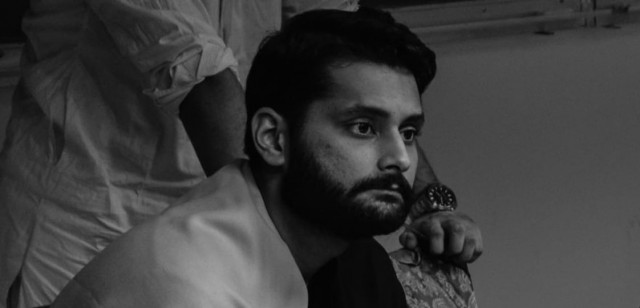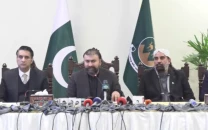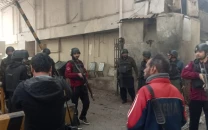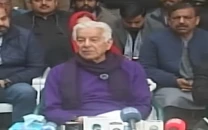Losing Sabeen, keeping momentum: a conversation with Jibran Nasir
What makes the civil society activist less of a liberal and more of a radical

PHOTOS: REUTERS
He’s giving a talk at New York University to an enraptured audience, consisting mainly of Pakistani students and members of the expat community – just one in a US-wide series at universities and community halls to spread the word about two of his projects, NeverForgetPakistan.com and PakistanForAll.

- PHOTO: FAWZIA NAQVI
The conversation has changed in the last 24 hours however. Nasir speaks about Sabeen, explaining she was his mentor and supported him to run for elections when no one else did, and told all her friends and supporters to do the same. When he took protests to Lal Masjid, she hopped on a plane and joined him there. She was there for him and for their cause, through thick and thin, he says. There is a hushed silence.
Read: Investigators draw blank in Sabeen Mahmud murder case
From there, his speech goes in directions completely unexpected. There is no talk of “Pakistan ka naam roshan karna”, no talk of corruption, nothing on “enlightened moderation”, although this is what his audience is likely more accustomed to. Instead, there’s a brutal and almost frightening honesty. He clarifies that when he speaks of the State, he speaks not only of the government but also the military. The rest of his presentation is about how the Ahle Sunnat Wal Jamaat (ASWJ) -- (he refuses to call them anything but the Sipah-e-Sahaba Pakistan) -- has connections with every major party across the political spectrum: the Pakistan Peoples Party, Pakistan Muslim Leagure-Nawaz, Muttahida Qaumi Movement and Pakistan Tehreeh-e-Insaf, and he links this to a long history of the role of the army in politics. He reassures people: “I’m not here as the fifth option – the best route is to get more involved in your party of choice and work from within to reform it”. At the end, when asked if the information he provided shocked them, almost the entire audience raises their hand in affirmation.
In private, Nasir starts out with the same self-assurance that has surely been helped by the adulation he’s received from what people would refer to as Pakistan’s ‘liberal class’. I ask him what politics is for him and without a second’s hesitation he responds, “Public service”. His opinions seem to spill out endlessly as he paces around the room, and often, I find myself having to ask him to focus on the question at hand; this appears to be a function of an almost manic restlessness.
Read: The lone warrior - Jibran Nasir

- PHOTO: MOHAMMAD NOMAN/ EXPRESS
But if one probes a little further, the narrative gets a little more complicated. The Jibran Nasir of the 2013 elections is not the Jibran Nasir of today. His politics have now gone far beyond “public service”. For one, he is not interested in running for elections at this point at all: “I don’t have to be the MPA or MNA. I can work with the MPA and MNAs who are already there”. In short, he’s started to envision a different politics for himself. When I ask what the long term plan is, he makes himself clearer: “Making every political party have counter-terrorism and counter extremism as its number one agenda and make meeting militants a stigma, the way political parties at one point made the idea of friendship with India.”
This seems ordinary enough, by liberal standards. So what’s different, I ask? What differentiates him from USAID, which fits into the standard “win the hearts and minds of the people through development” narrative? Nasir argues he’s far more nuanced than that. For example, he says, it’s not just about education. “It’s about the quality of the education curriculum. Literacy is one thing, quality is another.” He’s also taken great pains to clarify that all the funding he has received to conduct politics and speak on American campuses comes from Pakistani citizens. He made an active, political choice to never ask for, or receive money from any foreign government.
Read: Symbol of peace: Residents link hands to form human shield outside imambargah
The larger plan aside, he’s teeming with a myriad of other ideas which he explains in a rush: The NeverForget project. A Pakistani equivalent of the American Civil Liberties Union (PakistanForAll). A mobile app that helps get a political movement organised. But this is where a hint of bitterness starts to creep in: “People say I’m spreading myself too thin. But I don’t think I am. I’m telling people to take these ideas, to use them.”

- PHOTO: HEBA ISLAM
And before you know it, the confidence and the rhetoric is replaced by a certain loneliness and frustrated anger, and a cynicism which is at odds with a rhetoric filled with so much idealism otherwise. And that anger isn’t directed towards those who spew constant hate speech against him, or call him an agent or a member of “the mombatti mafia”. It’s directed towards those from whom he expected better. “Someone came up to me and asked me if I can increase my rhetoric against the military.” His voice rises. “I’m thinking, you’re telling me to sharpen my rhetoric, would you ever stand on the street and say half the things I do?”
Read: Colours revealed
There’s a silence as that question hangs in the air, and it brings me back to Sabeen Mahmud who expressed the same sentiment so very recently in a Facebook outburst of frustration at those who say this is not enough, but only from the side lines.
The interview ends, and Nasir fields calls from scores of supporters, friends and family pleading him not to return to Pakistan. He’s not going to listen to them, of course. Perhaps that’s what prevents him from being your standard liberal, and perhaps that’s what makes him more radical than he realises. Nasir is strangely, even crazily fearless enough to say on the streets what many won’t ever say outside their drawing room, and he’ll speak out for religious minorities, or criticise the role of intelligence agencies, in Karachi as he would in New York.
But with Sabeen gone, and as Nasir walks away towards the subway, I look at this lone figure from the back and wonder – why is he alone? Why does Nasir say there is no one in politics he sees himself aligning with politically? Where one thinks of Sabeen, or Rashid Rehman or Perween Rahman and with Nasir attempting to pick up the mantle, why does it appear that those being picked off one by one are lone rangers? Perhaps, the answer lies in the pitiably small protests which Nasir feels so strongly about, while we say: “If only protests could make a difference: But we know they won’t.”



















COMMENTS
Comments are moderated and generally will be posted if they are on-topic and not abusive.
For more information, please see our Comments FAQ